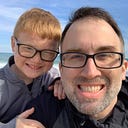Lessons from the ER
“This is for you.”
I remember the sun shining from the front glass windows. There was a person signing in to my right. I sat at the welcome desk. My eyes tracked to the outstretched hand that held a note.
The note said the person had taken a large amount of pills, consumed a large amount of alcohol, and wanted to die. By the time I looked up, they were out on the lobby floor.
You’ll Never Forget Your First Code
They told me in training. My second week, it happened. A car accident. The patient’s spouse standing in front of me. I read the note on the screen that their loved one would not make it through their ambulance ride.
I’d asked them to have a seat.
“You’re making me nervous,” they replied. I tried to smile.
They left that evening without their partner, their significant other.
Death will not wait. We take for granted the routines of life, the acts that seem safe because we’ve done them a million times before. Until one experience that changes everything.
I was at the discharge desk. The patient wanted to leave, but we needed paperwork. I went to the back to find the nurse involved. He was not available, so I found the doctor. They provided me the paperwork I needed and, as I crossed the back of the treatment area, the nurse intercepted me.
Red faced, finger pointed, screaming.
Why did I go around him? Why was I trying to make him look bad? What the hell was my problem? He continued to yell and point until the entire room was silent. He walked to the waiting room and stood behind the patient yelling at them, demanding to know why they wanted to leave and why they “lied” to him.
It is not always about the patient. Ego will, at times, win. You can only do your best and keep going.
I’m Sorry, I’m Sorry, I’m Sorry
“Don’t let anyone back for a while, we have a pediatric code coming in.”
A sliver of ice ran the length of my spine. I asked the security guard to stay out front and he agreed. The treatment area would be closed to extra people. As a father of two boys, young at the time, my mind jumped to them.
Pediatric code. Child dead.
I tried not to make eye contact with the family. This night would forever change their lives. It was sacred, a space it did not feel right to exist inside.
The parent had fallen asleep at home. The child, younger than my boys, had found their way outside to the pool and fallen in.
I heard the cries of the parent for days after. “I’m sorry. I’m sorry. I’m sorry.”
A coworker had told me, when the coroner arrived for the body, they had found a nurse in the room holding the child’s hand.
Life and Death
We had babies delivered, people arrive deceased and get admitted to a hospital room to find themselves discharged a day or two later. Heart attacks, strokes, addicts and mental breaks. Successful and unsuccessful suicides.
We had young and old, rich and poor, angry children and lost parents.
We had patients with enough money to buy the building and ones who’d wandered in off the streets for a place to get warm.
These days, in the midst of turmoil and pandemic, I think back to my two years in the emergency room, the start of almost ten years in the medical field counting this crazy 2020.
Death teaches us about life.
Death is the mirror. It has a way to expose truth on grand scales and intimacy that we’d never known possible.
Death is not the end. Death is a chapter in the story.
Legacy follows.
Every day you write yours. Do it well.
